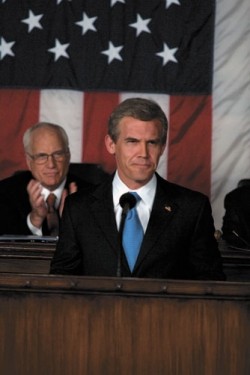Oliver Stone's W. arrives at a peculiar time in history. George W. Bush's approval rating is at 25 percent, the lowest of any president since Gallup began polling. Many Americans, fixated on the tanking economy and a contentious presidential election, have to be reminded that Bush is still president. Really, it can't be auspicious to release a movie whose subject is a person no one wants to see, hear or think about.
If W. were the raucous satire its preview trailer suggested (George Bush Sr. to the incorrigible Junior: "Who do you think you are, a Kennedy?"), it might be cathartic to watch. But Stone and screenwriter Stanley Weiser (Wall Street) have taken Bush's life - the stuff of low comedy - and painted it as tragedy. The story of Nixon had a tragic-operatic quality, which Stone explored in the excellent Nixon. Even John McCain's story has classically tragic elements. But Bush? The most fitting treatment may have been the short-lived TV satire That's My Bush.
However unwelcome its subject, though, W. is a worthwhile spectacle. Stone's direction is powerful, and the performances, for the most part, are uncanny. Josh Brolin acts up a storm, splendidly animating Bush's evolution from reckless fratboy to hapless Commander-in-Chief. Richard Dreyfuss slides into the skin of Dick Cheney and becomes the slithery, Machiavellian VP.
But Weiser's conception of Bush relies heavily on caricature - Bush yellin' and whoopin' Texas-style, driving drunk, dancing atop a roadhouse bar. In reality, making fun of Bush's cowboy style went out of fashion the minute he invaded Iraq. He was no longer a joke but a horror. Reproducing, as the movie does, his malapropisms ("Is our children learning?") also doesn't address the abiding mystery of whether Bush is more intelligent than his public persona suggests. If he really were the dumb lout portrayed in W., could he have graduated from Harvard business school or won the heart of smart, bookish Laura (Elizabeth Banks)?
W. alternates scenes of Bush's wasted youth with talky cabinet meetings before and after the Iraq invasion. As the two-hour movie wears on, the meetings - so dreary compared with the colorful personal segments - threaten to bore the audience to death (a woman was snoring loudly in a seat near mine). Adding to the tedium is that we know where everything's headed: pretty much nowhere.
Ho-hum. Is it November 4 yet?
It is fun, though, to see Stone's choices in casting White House characters. Thandie Newton captures Condoleezza Rice's pinched finishing-school smugness and adds a snotty contempt for Colin Powell (Jeffrey Wright), whom the movie makes the spokesman for all objections to the neocons' imperialist designs. Unfortunately, Wright plays Powell with an accent that sounds more like Robert Downey's blackface character in Tropic Thunder than the former Secretary of State.
The movie's narrative is a clichéd father-son conflict: a privileged wastrel's lifelong struggle to earn the approval of his distant dad, George H.W. Bush (James Cromwell), who is portrayed as an exasperated patriarch and honorable statesman. Cromwell forgoes direct impersonation, playing Bush 41 straight, rather than imitating his oft-lampooned patrician whine. The movie, unfortunately, accepts the Bushes' all-American view of themselves. Why would the conspiracy-minded director of JFK overlook the nefarious Nazi-financing history of the Bush family? As for Bush mre, Ellen Burstyn is too sweet and lovely to be persuasive as the haughty Barbara Bush, who said Katrina victims were improving their lot by sleeping in the Astrodome.
The father-son narrative is biographically accurate, but why should we care about the personal struggles of a man who wiped his feet on the Constitution, let a city drown and whose twisted messianic vision brought death and destruction to so many innocents? The movie recites a litany of sins: "enhanced interrogation techniques," media blackouts on flag-draped coffins, Bush visiting horribly mangled soldiers and giving them patriotic T-shirts. To be effective, though, W. needs to tie the personal and political into a strong, coherent statement.
It doesn't.


